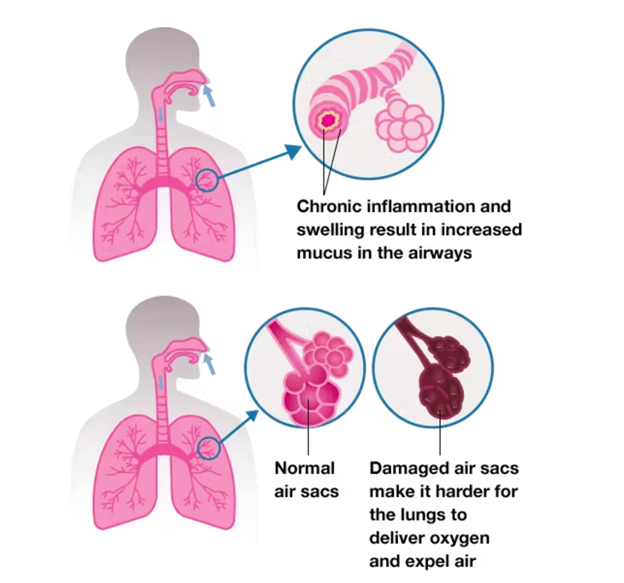

Understanding COPD in Seniors: Symptoms, Treatment, and Lifestyle Management
-
- October 3, 2023
- Disease Prevention and Treatment
- Karina Bailey, FNP-C
COPD, the term used to refer to chronic obstructive pulmonary disease, is a lung disease that makes it difficult or uncomfortable to breathe. Over ten percent of adults 65+ are living with COPD.
It is common for seniors with COPD to need hospitalization. In fact, the disease is one of the leading causes of hospitalization for older adults and roughly twenty percent of all hospitalizations of individuals over the age of 65 in the U.S. are for COPD and its symptoms.
The main cause of COPD is tobacco smoke, but frequent exposure to air pollution and an individual’s family history can impact the risk of developing COPD.
Symptoms
Symptoms of COPD can be confused with general sickness and older adults can think these signs are typical of the aging process. Many times, people with COPD will have “flare-ups” or weeks where their symptoms are more frequent. These symptoms are often worse in the winter months.
Frequent fatigue or shortness of breath: What you think may be tiredness and shortness of breath due to lack of exercise or normal aging could be COPD. Seniors with COPD will also often get fatigued while coughing or after coughing.
Chronic cough and coughing up mucus: COPD can first show up in seniors as a cough that won’t go away. Wheezing can also be present with cough. COPD also produces excess sputum (mucus or phlegm) This sputum can be worse in the mornings.
Chest tightness: Seniors with COPD may complain that it feels painful to breathe or it is hard to take a deep breath.
Loss of appetite: Difficulty breathing can commonly cause lack of interest in eating. Some seniors with COPD may also feel like food does not taste as good as it used to. Both can lead to weight loss.

Treatment and Management
While there is no cure for COPD, treatments can help slow the progression of the disease. Individuals with COPD must work with their healthcare provider to discuss the best plan of action for their health. Below are a few ways seniors can manage the disease to live a healthier and happier life.
Quit Smoking: Quitting smoking will make the biggest difference in managing and slowing the progression of COPD in seniors. This is the most important step for seniors with COPD to take.
Stay up to date on vaccinations: Lung infections and viruses can cause serious issues for adults with COPD. That’s why seniors with COPD need to receive the flu, COVID-19 and pneumonia vaccines.
Medicine and oxygen: Medication can help coughing and wheezing and portable oxygen tanks may be necessary if blood oxygen levels are low. Your primary care doctor will determine which medication is best for you.
Pulmonary Rehabilitation: A doctor may suggest a pulmonary rehabilitation program that combines exercise, nutrition support, and other disease management techniques to improve lung function and risk of hospitalization.
Avoiding triggers: Older adults with COPD should do their best to avoid situations that could trigger symptoms like coughing. These include staying inside on bad air quality days, avoiding perfumes, allergens, deodorants and cleaning supplies that may trigger your COPD, and staying away from all forms of smoke.
If you are a senior living with COPD, ArchWell Health providers can help you navigate the questions that come with your diagnosis. Our team of social workers may also suggest you find a Better Breathers support group sponsored by the American Lung Association. Better Breathers clubs were set up to help older adults struggling with the day-to-day changes of living with COPD. These meetings allow seniors with COPD to build community and learn ways to manage their disease.
Disclaimer: The article provides information designed to complement your personal health management. It does not provide medical advice and not meant to replace professional medical advice. Linking to other websites does not imply any endorsement of the material on such websites.
Cholesterol 101: Screenings, Numbers and Five Smart Steps for Better Health
- Disease Prevention and Treatment

About the Author
Karina Bailey, FNP-C, Nurse Practitioner, St. Petersburg
Karina Bailey, a Certified Family Nurse Practitioner (FNP-C), grew up in Orlando, Florida and now she’s putting her skills to use by providing quality care for seniors. “I believe the geriatric population deserves providers who promote exceptional healthcare,” she says. “I chose ArchWell Health because of the care model it provides to a population and community that is in need of comprehensive care.” Married with three children, Karina still finds time to enjoy Pilates, traveling, and decorating.
Become an ArchWell Health Member today!
Joining ArchWell Health is easy. Just click the link below to get started. Before you know it, chair yoga class will be your weekly jam!